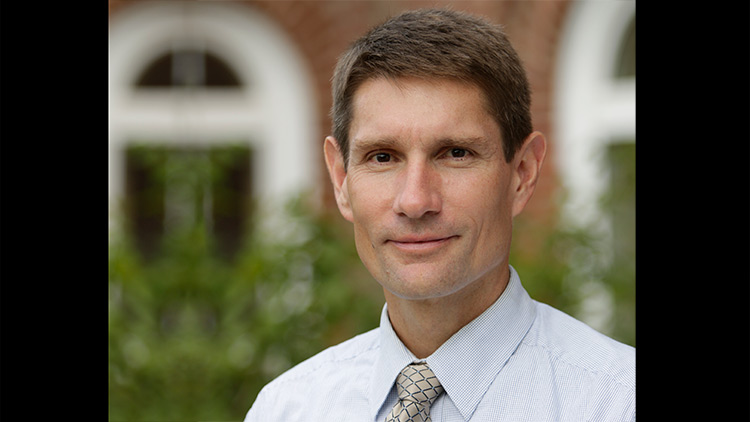Dr. Richard Isnor, StFX Associate Vice President, Research and Graduate Studies, is a contributor to an important new report that identifies the opportunities, challenges, and implications of deploying Artificial Intelligence (AI) technologies to enable scientific and engineering research design and discovery in Canada.

Dr. Richard Isnor
Over the past year, Dr. Isnor served as a member of the Council of Canadian Academies (CCA) Expert Panel on Artificial Intelligence for Science and Engineering, which recently released Leaps and Boundaries, a report in which the CCA, on the request of the National Research Council of Canada, examines the legal, regulatory, ethical, social, and policy challenges associated with deploying AI technologies to enable scientific and engineering research design and discovery.
"While AI has the potential to spur innovation and further scientific understanding beyond the limits of the human mind and abilities, it could also exacerbate inequities, perpetuate human biases, and even create new ones. Maximizing the benefits of AI and avoiding its pitfalls, will require addressing real and imminent challenges," a CCA release for the report explains.
The report, Dr. Isnor says, does not make specific recommendations, but summarizes the state of current knowledge and provides an outlook on the future, while also identifying issues requiring attention, discussion, and further study.
"We were tasked with shining some light on the opportunities associated with the use of AI in science and research, but also what the potential drawbacks, risks and associated policy issues are," says Dr. Isnor who was invited to join the 10-person panel in part because of his expertise in science policy and research administration for the better part of 30 years in Canada.
The Expert Panel brought together experts from across Canada and internationally who are knowledgeable about different aspects of the topic. Dr. Theresa Scassa, Canada Research Chair in Information Law and Policy at the University of Ottawa, served as Chair of the Expert Panel.
While Dr. Isnor stresses he is not an expert in AI, he has spent his entire career working in research policy and administration, and examining the policy issues associated with emerging technologies, especially transformational technologies, which can have profound impacts on society and individual lives.
Dr. Isnor says the panel provided input and commentary on a variety of issues related to the topic and were supported by a highly skilled research team based at the CCA. The process was rigorous and included external peer review.
He says their findings help educate people and could lead to research agencies developing new procedures, policies, and practices, as well as new areas of research.
The National Research Council of Canada sponsored the report with support from the Canadian Institute for Advanced Research (CIFAR), Canadian Institutes of Health Research (CIHR), Natural Sciences and Engineering. Research Council (NSERC), and Social Sciences and Humanities Research Council (SSHRC).
Dr. Isnor says the science agencies are interested in how AI might impact research and scientific discovery in the future.
"There are incredible opportunities for AI to contribute positively to scientific discovery and help drive it forward. At the same time, there are also potential risks," he says. "These issues will have to be addressed by governments, research agencies, and educational institutions that are training current and future generations of researchers across disciplines. Early career and future researchers need to become more versed in both the techniques of AI, even if their work is well-outside of the discipline of computer science. Moreover, they will also need to understand the ethical, and policy issues associated with the use of AI in research and discovery. Given how quickly AI continues to develop, it will very soon begin to play a very significant role in scientific and engineering research. It's anticipated that AI will be used to develop novel scientific hypotheses and experiments, and create new engineering design processes, with less and less reliance on human programming."
Leaps and Boundaries emphasizes that efforts to realize the promise and potential benefits of AI will require addressing real and imminent challenges from possible biases, from the people who build it, and to the institutions and governments whose policies are intended to regulate it. Ensuring the responsible use of AI may spur innovation and further scientific understanding, but there will be numerous issues that need to be addressed to prevent or minimize negative impacts or risks. "Policies to address emerging technologies such as AI lag far behind the pace of scientific advancement," notes Dr. Isnor," that's why having the CCA conduct these types of assessments is so important. The research agencies involved in sponsoring this assessment should be commended for their foresight."
Dr. Isnor found the experience of serving on a CCA Expert Panel to be incredibly rewarding. "I found it to be an interesting opportunity to learn about this new technology, as well as interact with such a diverse and well-informed group in exploring the issues we were assigned," he says. "It was a fun and interesting process. The CCA is the gold standard for provision of advice to government and society, and takes on a wide variety of independent, science-based, authoritative expert assessments to inform public policy development in Canada."












